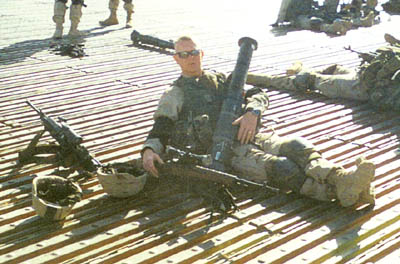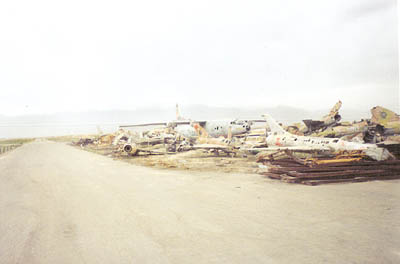By JANIE SOUTHARD
jsouthard@dailystandard.com
ST. MARYS — There’s no plumbing, no sewer system,
no groceries, no phones, no restaurants. There’s little
food and the people are on the move constantly seeking shelter,
usually carrying everything they own with them.
 That’s
Afghanistan as Army Infantryman Jeff Albright has seen it during
the past months. That’s
Afghanistan as Army Infantryman Jeff Albright has seen it during
the past months.
A designated marksman with Task Force Panther, Albright recently
spent a three-week leave in St. Marys with his wife, Marcie,
and family and friends before heading back to Fort Bragg, N.C.
Then he’ll ship out with his unit to an overseas destination.
Designated marksman is the preferred military term for sniper,
and Albright’s shooting accuracy put him in that elite
group of soldiers.
Shunning the word elite, he said he’s just a little drop
in the bucket, that there are thousands like him doing what
they’re trained to do.
“I am proud to serve America however I can. Yes, I’m
a sniper, but it isn’t a glamorous job. It’s nothing
like what you see on television. I’m simply doing what
I’ve been assigned to do just like the cooks do and the
medics,” said the blond, blue-eyed soldier.
He spoke of the excellent equipment with which he’s been
provided, noting that good marksmanship in general boils down
to practice, patience and good equipment.
“I use a thermal-maging scope at night that probably cost
$25,000. If someone is smoking a cigarette a mile away I can
see them because of the heat from the cigarette,” he said.
He has served on many military operations in Iraq, one of which
was six weeks spent protecting Iraqi Governing Council President
Hamid Karzai.
But his main objective has been to locate weapon caches and
to locate and capture Taliban forces.
Of his return to Fort Bragg he said he knows he’s not
shipping back to Afghanistan.
 “But I can’t say where we are going, other than
it’s an overseas destination,” Albright, 31, told
The Daily Standard last week in his living room in St. Marys
with military gear stacked neatly in the corner.
“But I can’t say where we are going, other than
it’s an overseas destination,” Albright, 31, told
The Daily Standard last week in his living room in St. Marys
with military gear stacked neatly in the corner.
There’s a lot he can’t say, but he did offer some
observations on his life in Afghanistan during the past treacherous
months. A capable photographer, he also spread out some photos
of Iraq on the sofa.
The landscape is stark and the air is contaminated. Although
Albright’s photos are in color, the countryside and mountains
almost appear in sepia tones.
Closer photos show thousands of holes in the mountains which
line the horizon in almost every snapshot.
“Those are the caves you probably hear about on television.
And, yes, people live in them including al- Qaida forces,”
he said, noting the caves often interconnect allowing undetected
movement from cave to cave.
Of the air Albright said it reflects the unsanitary conditions
in Iraq.
“It’s just disease infested. Since there are no
sewer systems, body waste is everywhere. Anywhere from 40 to
60 percent of the air we’re breathing is dried fecal matter,
which has been absorbed as dust,” he said.
The United States provides medication to head off health threats,
he said, and the troops are trained in good field cleanliness.
Although, it may be a long time between showers.
“It’s about 120 degrees there in the summer, and
we carry a lot of heavy equipment. Sometime it’s as much
as three weeks before we can get a shower. That’s why
we’re so excited to get the baby wipes,” he said
with a slow smile.
Another shot showed a half dozen captured al- Qaida kneeling
in Albright’s desert encampment with cloth bags over their
heads to prevent them from seeing the layout of the camp, the
weaponry and number of U.S. troops present.
Are they docile when captured? Do they seem like regular people
caught up in a cause?
“No, and no. They are fanatics. Wild,” Albright
said.
A third photo was of what looked like a junkyard in the middle
of nowhere.
“It is a kind of junk. It’s old Russian planes from
20 years ago. You see that piled around everywhere. There’s
no way to clean it up. There’s no machinery to move it,
and even if you could there’s nowhere to take it. I imagine
it’ll sit there forever,” he said.
It’s the same with automobiles.
Should the locals somehow acquire a vehicle and it fails, there’s
no way to fix it.
“No way even to get it to a garage if they could fix it.
Remember, there are no tow trucks and no parts stores. So the
old cars are abandoned wherever they break down,” said
the trim, toned sheriff’s deputy who is on military leave
from the Auglaize County Sheriff’s Office.
Albright has 18 months left of his three-year term and does
not plan to re-enlist.
“(Other military personnel) keep telling me I should re-enlist.
They say ‘this is you, man.’ ”
“No, it’s not me. It’s a job to do. When I
leave I’ll know I did what they asked me to do. But I’m
coming home,” he said firmly.
Although being in harm’s way has not been an “enormous
concern,” Albright believes his family has suffered more.
“I may be over there sweatin’, stinkin’ and
starvin,’ but my wife is sitting here in this room not
knowing and wondering. Definitely, I think here is harder,”
he said.
|

